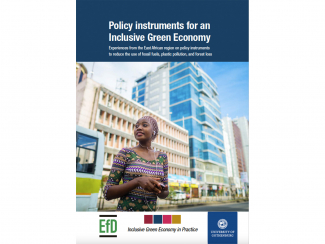FILTER
Displaying 21 - 30 of 362 publications
Are the forest conservation practices sustained after Payment for Environmental Services (PES) programmes end? Using a sample of 268 (former) PES recipients and non-recipients from the Budongo-Bugoma...
| Peer Reviewed | Uganda
Despite the potential for forest resources to act as a less costly shock-coping strategy for rural households, evidence of the nexus between access to forest resources and the nature of coping...
| Peer Reviewed | Uganda| Peer Reviewed | Uganda
Central and South America (CSA) are highly exposed, vulnerable, and strongly impacted by climate change, a situation amplified by inequality, poverty, population growth and high population density...
| Book Chapter | Central America and MexicoAbstract The Amazon biome, spanning nine countries, has one of the highest rates of deforestation worldwide. This deforestation contributes to biodiversity loss, climate change, the spread of…
| Peer Reviewed | Colombia
This study aims to establish whether three technology-specific attributes – convenience, compatibility with cultural needs and social reputation – influence the sustained use of clean cooking...
| Peer Reviewed | UgandaAbstract Sub-Saharan Africa’s urban ecosystem is under considerable pressure due to rapid urban sprawl and high direct dependency on the natural ecosystem. But the value of nature conservation or…
| EfD Discussion Paper | TanzaniaForests offer the potential for implementing nature-based solutions that provide simultaneously economic, social, and environmental benefits. Forests and Land-use are part of a larger initiative to…
| Report |
Abstract: With increasing scarcity and spatial dispersion of tree resources, Uganda's forest sector – similarly to several other countries in Sub-Saharan Africa – has experienced a shift from the...
| Peer Reviewed | Uganda